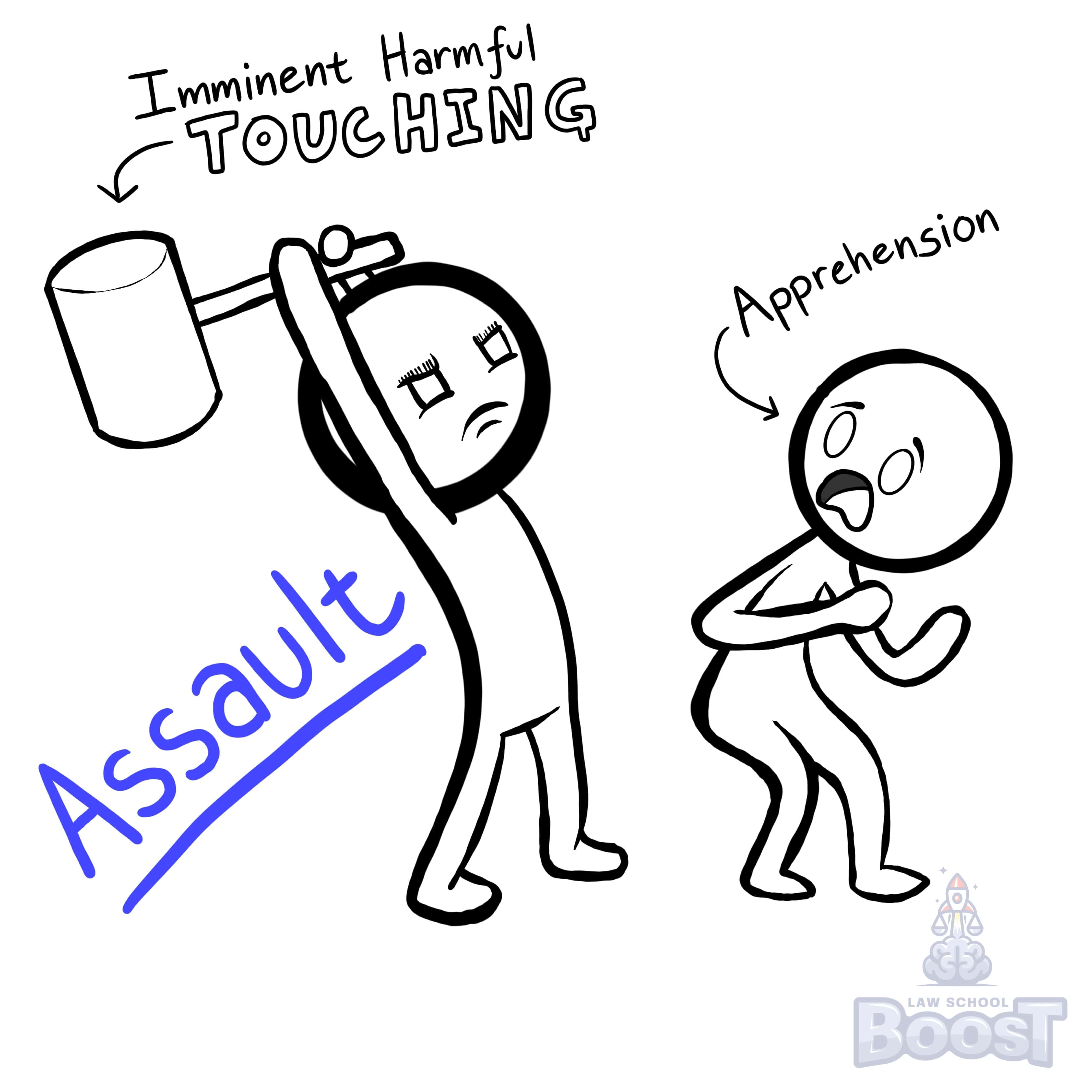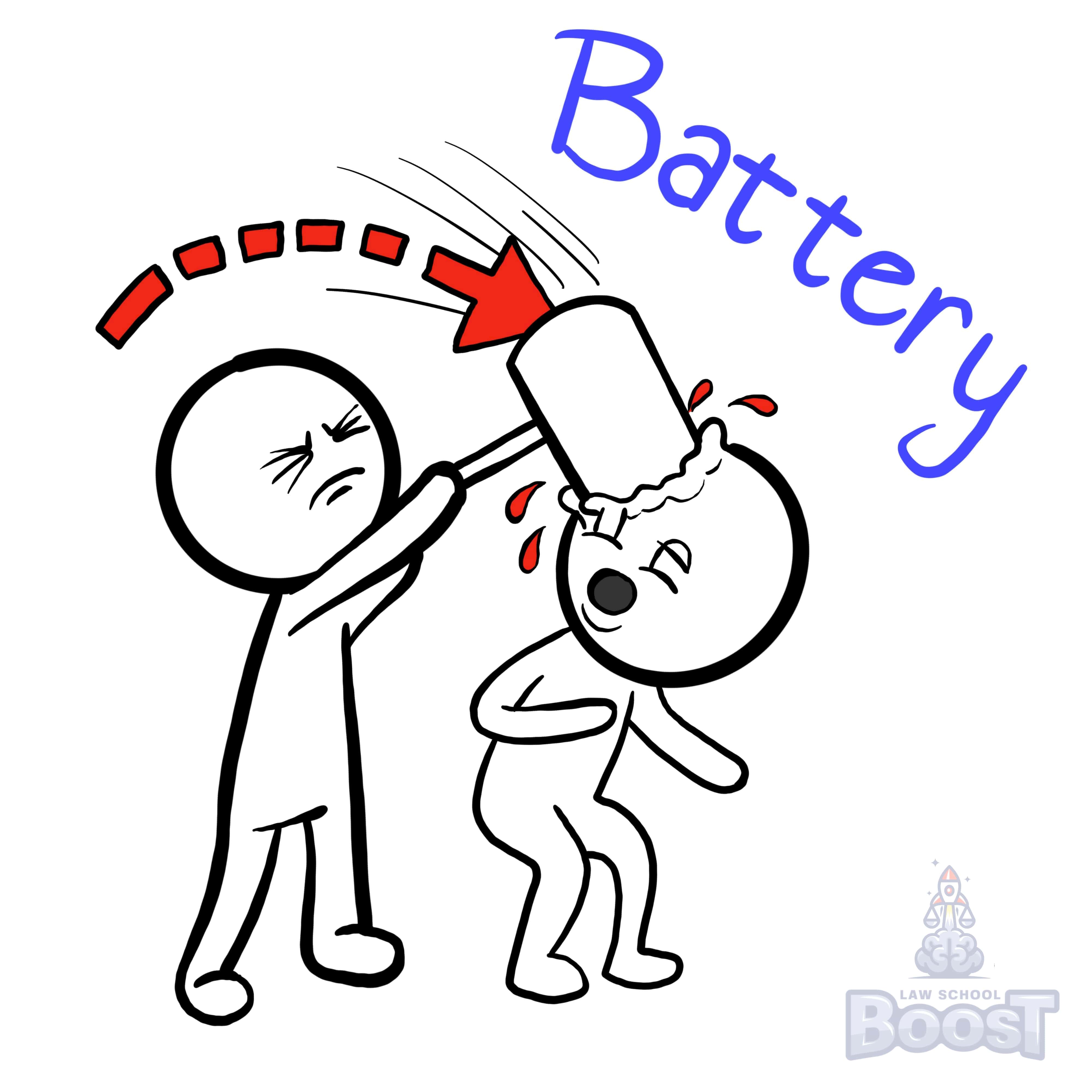💕
Criminal Law • Excuse
CRIMLAW#028
Legal Definition
Battery is the unlawful application of force to another person, causing bodily injury or offensive contact.
Plain English Explanation
Legally speaking, everyone has an imaginary forcefield that wraps around their body and anything their body is intimately or immediately connected to. When another person intentionally touches your forcefield against your will, a battery has occurred. The most obvious example is if someone punches you in the face, where a person has intentionally chosen to swing their fist at your face, resulting in a "harmful contact" (i.e., your face getting punched). But the key to identifying battery in a fact pattern is to keep the "forcefield" aspect in mind. Look to see what intentional harm has been committed by an individual, and then look to see if any other individuals were, in some way, connected to that harm. For example, if you are holding a plate of food and someone smacks the plate out of your hands, though they may not have directly touched your person, the plate was within your forcefield of intimate space, and smacking it away results in a battery.
Another aspect of battery to keep in mind is that a person can commit a battery if their actions are substantially certain to result in harm to the victim. In other words, imagine a chain of events being a series of dominos and, where someone intentionally sets into motion a series of events that results in those dominos being toppled and results in harm being caused to the victim, they are responsible. The most famous case involving this concept involved a child who, right before their teacher sat, pulled a chair out from under them causing the teacher to fall and hurt herself on the ground. Though the child never touched the teacher, they should have known with substantial certainty that removing a chair from someone about to sit down results in them falling and hurting themselves.
Finally, note that a failed battery generally results in an assault, meaning that an attempted battery that results in a person not actually touching another person likely meets all the elements of an assault.
Another aspect of battery to keep in mind is that a person can commit a battery if their actions are substantially certain to result in harm to the victim. In other words, imagine a chain of events being a series of dominos and, where someone intentionally sets into motion a series of events that results in those dominos being toppled and results in harm being caused to the victim, they are responsible. The most famous case involving this concept involved a child who, right before their teacher sat, pulled a chair out from under them causing the teacher to fall and hurt herself on the ground. Though the child never touched the teacher, they should have known with substantial certainty that removing a chair from someone about to sit down results in them falling and hurting themselves.
Finally, note that a failed battery generally results in an assault, meaning that an attempted battery that results in a person not actually touching another person likely meets all the elements of an assault.
Hypothetical
Hypo 1: Sam likes to walk his dog off-leash, which upsets Bob. One day, Bob sees Sam's dog 20 feet away from Sam, digging through a flower bed. Bob walks over to Sam's dog and kicks it. Result: Though there may be an argument for property damage (dogs are property), no battery has occurred against Sam.
Hypo 2: Sam keeps his dog on a leash at all times, but Bob is still upset that Sam let his dog poop on his lawn. One day, Bob comes up to Sam and kicks his dog. Result: Bob committed a battery against Sam because Bob intentionally invaded Sam's person and intimate space to cause harm.
Hypo 3: Bob hates Sam. One day, while walking down the street, Bob accidentally trips and, while falling, lands on Sam and breaks Sam's leg. Bob is really happy that Sam not only caught his fall, but has a broken leg. Result: No battery has occurred. It doesn't matter if Bob enjoyed Sam's resulting injury. Here, Bob tripped on accident, which means Bob did not intend to fall, or hurt anyone.
Hypo 4: Bob sees Sam jumping on a trampoline. As Sam bounces higher and higher, Bob kicks the trampoline out from under Sam, who falls to the ground and injures his legs. Result: Bob has committed a battery against Sam because he should have known with substantial certainty that his actions would result in Sam being harmed.
Hypo 5: Bob sees Sam about to jump off his roof. Bob realizes that Sam will likely hurt himself. Next to Bob is a trampoline that would likely save Sam if Bob slides it underneath Sam as he falls to the ground. Instead, Bob sits on the trampoline and eats popcorn while he watches Sam fall, breaking his legs. Result: No battery occurred. Though Bob could have prevented Sam from injuring himself, Bob had no duty to act, and so is inaction cannot be blamed for Sam's injury.
Hypo 2: Sam keeps his dog on a leash at all times, but Bob is still upset that Sam let his dog poop on his lawn. One day, Bob comes up to Sam and kicks his dog. Result: Bob committed a battery against Sam because Bob intentionally invaded Sam's person and intimate space to cause harm.
Hypo 3: Bob hates Sam. One day, while walking down the street, Bob accidentally trips and, while falling, lands on Sam and breaks Sam's leg. Bob is really happy that Sam not only caught his fall, but has a broken leg. Result: No battery has occurred. It doesn't matter if Bob enjoyed Sam's resulting injury. Here, Bob tripped on accident, which means Bob did not intend to fall, or hurt anyone.
Hypo 4: Bob sees Sam jumping on a trampoline. As Sam bounces higher and higher, Bob kicks the trampoline out from under Sam, who falls to the ground and injures his legs. Result: Bob has committed a battery against Sam because he should have known with substantial certainty that his actions would result in Sam being harmed.
Hypo 5: Bob sees Sam about to jump off his roof. Bob realizes that Sam will likely hurt himself. Next to Bob is a trampoline that would likely save Sam if Bob slides it underneath Sam as he falls to the ground. Instead, Bob sits on the trampoline and eats popcorn while he watches Sam fall, breaking his legs. Result: No battery occurred. Though Bob could have prevented Sam from injuring himself, Bob had no duty to act, and so is inaction cannot be blamed for Sam's injury.
Visual Aids



Related Concepts
How does the age of a perpetrator affect their criminal liability?
Under the Durham Test ("But For"), when is a defendant insane?
Under the Irresistible Impulse Test (volitional), when is a defendant insane?
Under the M'Naghten Test (cognitive), when is a defendant insane?
Under the Model Penal Code test (M'Naghten + Irresistible Impulse), when is a defendant insane?
Under what circumstances is assault a specific or general intent crime?
What are the most common excuses to committing crimes?
What is aggravated kidnapping?
What is involuntary intoxication, and when is it a valid defense?
What is kidnapping?
What is voluntary intoxication, and when is it a valid defense?


